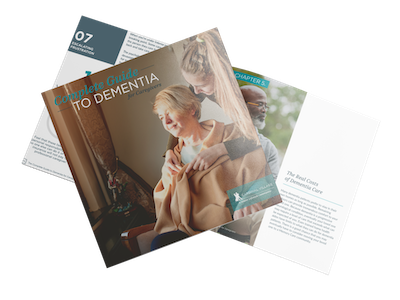There are many different forms of dementia, including the most common, Alzheimer’s disease. Dementia may also be a consequence of a stroke or infections, alcohol use, or brain injuries.
>> Read “Understanding the Different Types of Dementia”
One type of dementia is Lewy body dementia. It is the second most common form of dementia after Alzheimer’s, affecting more than 1 million Americans, according to the National Institutes of Health. It primarily affects people over 50 years of age, although younger people can have Lewy body dementia.
Here is more about Lewy body dementia, what causes it, what to watch for, and how it can be treated.
What is Lewy Body Dementia?
Lewy body disease, also called Lewy body dementia or dementia with Lewy bodies, is a progressive dementia, starting slowly and worsening as time goes on. It’s caused by an accumulation of alpha-synuclein protein in the brain, causing Lewy bodies. The protein deposits develop in nerve cells in the regions of the brain involved in memory, movement and thinking.
There are similarities between people with Alzheimer’s and Lewy body dementia. Both have tangles and plaques in their brains, which may make it hard to distinguish the difference between the two diseases. Some symptoms in Lewy body dementia differ from Alzheimer’s.
What Are Some Symptoms of Lewy Body Dementia?
Lewy body dementia causes different types of symptoms, according to the National Institutes of Health. Among these are behavioral, cognitive, movement and sleep.
Behavioral and Mood Symptoms
- Agitation – Fidgeting, handwringing, irritability, pacing, repeating words or restlessness.
- Anxiety – Feeling angry or fearful when a loved one is not present, or asking the same questions repeatedly
- Apathy – Lack of interest in normal daily activities or events, and less interest in social interaction
- Delusions – Strongly held, but false, beliefs or opinions not based on evidence, such as believing a deceased spouse is still living.
- Depression – A mood disorder that causes a persistent feeling of sadness and loss of interest.
- Paranoia – An extreme, irrational distrust of others, what they say or what they do.
Cognitive Symptoms
- Non-visual hallucinations – Hearing or smelling things that are not present is less common
- Severe loss of thinking abilities – Ideas may be disorganized, illogical or unclear. There also may be confusion about time and place, difficulty with language and numbers, or poor judgment.
- Unpredictable behavior – Unexpected changes in alertness, attention, concentration and wakefulness from day to day and sometimes throughout the day
- Visual hallucinations – Seeing things that are not actually present occurs in about 80% of patients
Movement Symptoms
- Balance problems and repeated falls – Some individuals may have balance issues, but those with Lewy body dementia face a greater risk
- Difficulty swallowing – Because of this, sufferers they may not eat enough
- Frozen stance, slow movement or shuffling walk – Individuals may need assistance with walking, such as with a cane or walker.
- Less facial expression – Faces may seem “frozen” without expression
- Loss of coordination – Individuals may have more accidents such as falling or leave them unable to take care of everyday tasks
- Muscle stiffness or rigidity – Stretching is encouraged to help with this condition
- Shaking or tremor, commonly at rest – These symptoms may mimic Parkinson’s
- Weak voice – Difficulty communicating can leave those affected detached from other people.
Sleep Symptoms
- Excessive daytime sleepiness – Sleeping more than two hours during the day can be a sign, according to the National Institutes of Health
- Insomnia – An inability to fall asleep, or stay asleep or waking up too early with an inability to get back to sleep
- REM sleep behavior disorder – Sometimes called dream-enacting behavior, this means physically acting out vivid, uncomfortable dreams with vocalization and often violent arm and leg movements
- Restless leg syndrome – An uncontrollable urge to move the legs because of discomfort, typically during the evening or night, while sitting or lying down
Other Symptoms
- Blood pressure problems
- Changes in body temperature
- Constipation
- Diminished sense of smell
- Dizziness or fainting
- Frequent falls
- Sensitivity to heat and cold
- Sexual dysfunction
- Urinary incontinence
In the early stages of Lewy body dementia, symptoms may be mild and may not interfere much with normal activity. However, since this is a progressive disease, sufferers will need more help with time as they experience a decline in movement and thinking. In the latter stages of Lewy body dementia, sufferers may depend entirely on others for care.

The Complete Guide to Dementia for Caregivers
Taking care of a loved one with dementia can be more than challenging. Read our eBook, “The Complete Guide to Dementia for Caregivers” which offers everything you need to know about caring for your loved one.
Download the GuideHow is Lewy Body Dementia Treated?
There are no treatments to slow or stop the progression of Lewy body dementia. Physicians therefore strive to ease the comfort of their patients.
Here are some ways physicians treat the symptoms of Lewy body disease.
- Antidepressants – Medications called selective serotonin reuptake inhibitors (SSRIs) may be used to treat depression, which is common in these cases.
- Antipsychotics – Medications are sometimes prescribed for behavioral symptoms in those with Alzheimer’s but they should be used with extreme caution. They may cause serious side effects in as many as half of those with Lewy body, including acute confusion, changes in consciousness, delusions or hallucinations, impaired swallowing, or worsening of symptoms.
- Cholinesterase inhibitors – Medications are commonly used in treating thinking difficulties in patients with Alzheimer’s. They may also help certain Lewy body symptoms.
Get the Help You Need at a Senior Lifestyle Community
At Senior Lifestyle, we believe you deserve to live life to the fullest. We create better lifestyles through innovation, personalized care and compassion. Residents can enjoy our award-winning services and amenities, which include tasty and nutritious meals, attentive security and staff, and engaging social connections throughout our communities.
Find out more about Senior Lifestyle communities or schedule a visit today.

